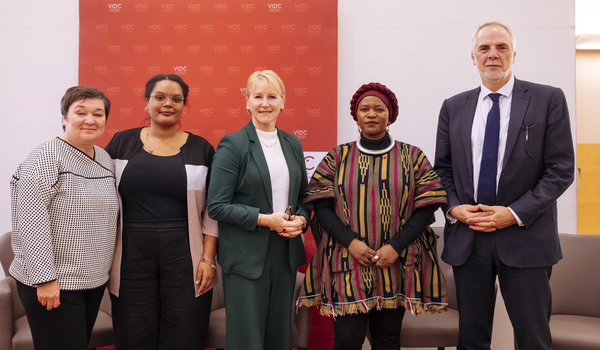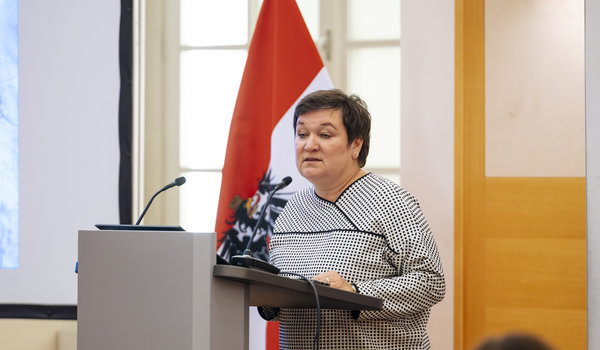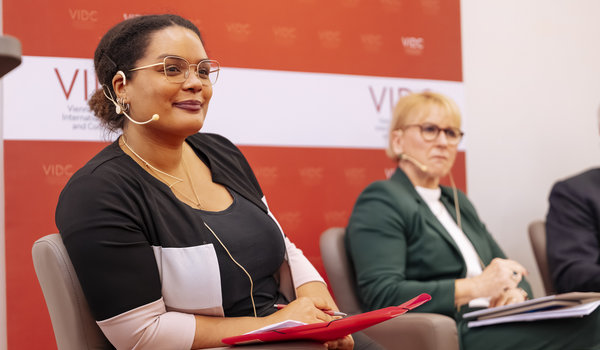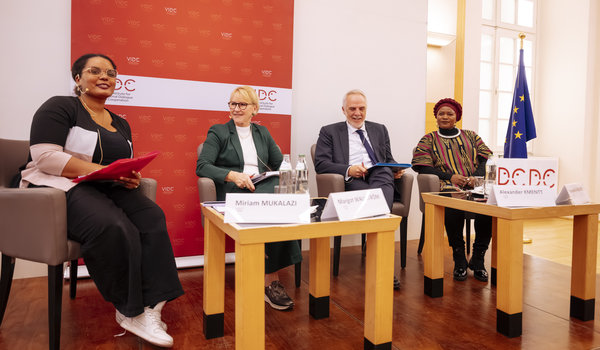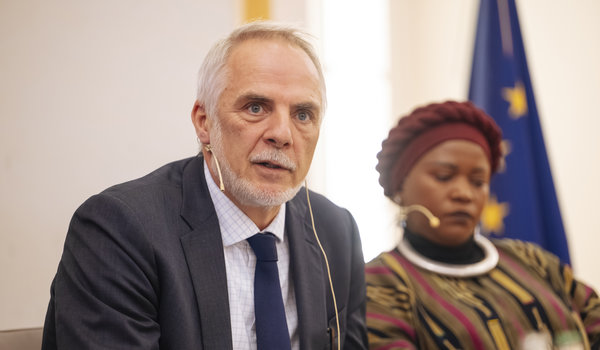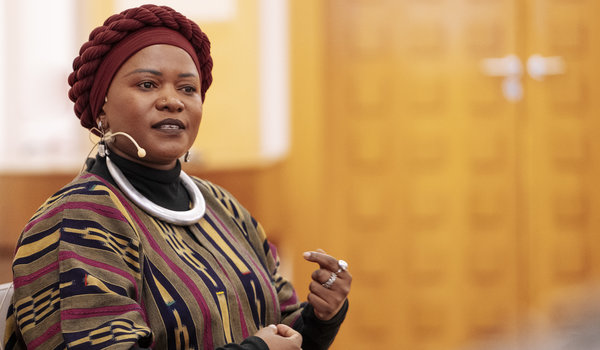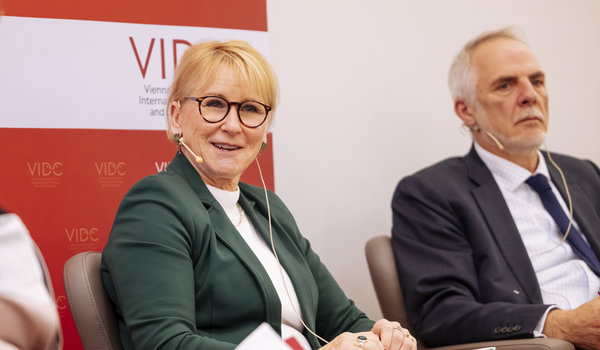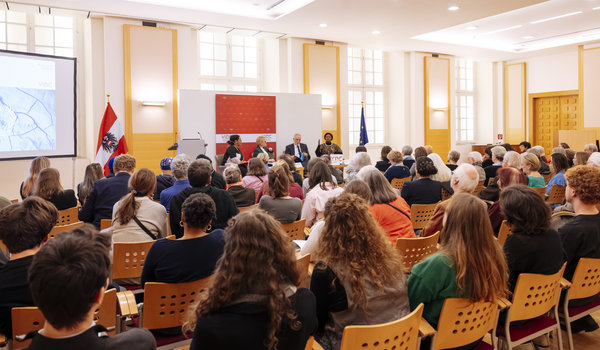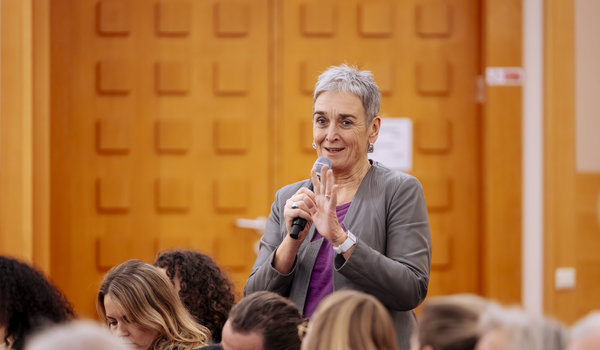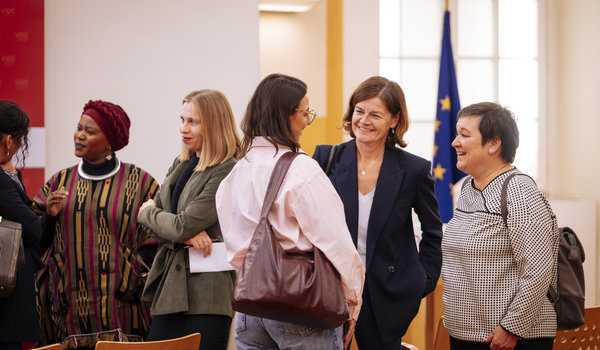The event hosted by VIDC at the Diplomatic Academy of Vienna brought together experts with activism and UN experience to discuss the 80 years since the foundation of the organization. The debate focused on the achievements and successes of the United Nations over the past decades, while also pointing out its limitations in promoting safety, peace and development across the globe. This year additionally marks 25 years since the implementation of the Women, Peace and Security (WPS) agenda, which highlights the crucial role of women in peace negotiations and the need for a gender-centered approach to global strategies. As a result, the debate, moderated by Miriam Mukalazi, explored different perspectives on the legacy of the UN, its role in international politics and the need for innovation to address current challenges.
What would the world be like without the UN?
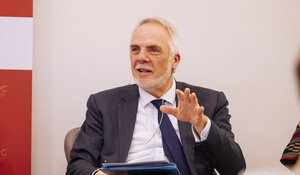
The United Nations has been a key institution promoting International Cooperation and Human Rights, developing legal and social mechanisms to advance shared interests of humanity and ensure safety for society. Alexander Kmentt, Director of the Disarmament, Arms Control and Non-Proliferation Department of the Austrian Foreign Ministry, brought his perspectives of the successes from the UN throughout the years. According to him,
“the biggest success, in a way, is the one we can’t prove. What would the past 80 years look like without the UN?”
The UN has been essential in preventing many more conflicts that could have erupted worldwide. “We would probably be in a much worst scenario”. Following that, Kmentt highlighted five areas of achievements from his point of view:
- peacekeeping, in which Austria has also been active, engaging in initiatives that promote sustainable peace
- the development of International Law and Human Rights Conventions, including the Convention on the Elimination of all Forms of Discrimination against Women (CEDAW) and the Convention on the Rights of the Child
- globalized security, as the UN has incorporated national security issues into global concerns, developing key treaties such as the Treaty on the Prohibition of Nuclear Weapons and the Nuclear Non-Proliferation Treaty, both strongly supported by Austria
- the facilitation of decolonization, through resolutions and support for independence movements
- development and humanitarian infrastructure, through the creation of the Sustainable Development Goals (SDGs) and various health and aid initiatives.
Through these efforts, we can better understand the relevance of the United Nations, even with its limitations, especially those tied to the UN Security Council.
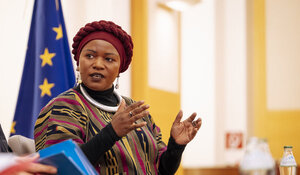
"It should not be normal that we need humanitarian aid. "
When addressing the role of a global institution such as the UN, it becomes clear that the unequal power dynamics shaping the international system also influence how much effort, resources and policy implementation reach different regions. Rosebell Kagumire, a Ugandan journalist and activist who writes as a columnist for The New Internationalist, joined the discussion to share her views on the tension between the UN’s successes and failures over its 80 years. She emphasized the silence of the international community regarding major humanitarian crises and widespread violence against civilians, such as what is currently happening in Sudan and the Democratic Republic of the Congo. Reflecting back on the foundation of the UN, Kagumire pointed out that African countries were not part of it in the beginning and still lack voice, power and legitimacy within a system ruled by a colonial legacy – even after formal decolonization. Decolonization was an important milestone for African and other Global South nations, yet global economic structures of debt and exploitation continue to impose limitations to autonomy and stability. As she said,
"the UN still is an institution that the highest decision makers are actually a small club of colonial entity that continues to impose its will on what the world can look like”.
Kagumire continued by stating that this structure should not be normalized and we should not sit back and accept that this is our destiny, with some African countries still far from having a place and a voice at the Security Council. Peace can look different in different contexts and for distinct groups of people. For that reason, it is important to ask critically: this is a successful story for whom? And who are we building peace for? Only by questioning and pushing for change we will be able to create a more equal system in terms of development, security and peace. As Kagumire emphasized, it should not be normal that African countries need humanitarian aid. Decolonization was a tool for these countries to exist in the international scenario and to be in the UN conversation, but cycles of war and instability are a product of colonization and continue to be sustained by the legacies of the imperialist powers that still dominate global politics, economy and institutions. A reconfiguration of power structures is necessary to prevent conflicts and violence in the first place.
The role of UN tools for women and a call for innovative ideas
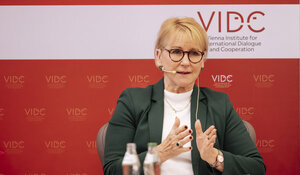
The United Nations faces evident gaps and challenges in implementing policies and ensuring an equal distribution of resources for missions and aid across the world. Although measuring success is difficult, it is even harder to imagine a world without the UN efforts in conflict and violence prevention, as well as its promotion of international dialogue and cooperation. Margot Wallström, former Swedish Minister of Foreign Affairs and a pioneer of the feminist foreign policy agenda, shared her insights on the inclusion of gender in UN resolutions and women’s participation in international politics. According to Wallström, the UN has played an important role in developing tools to promote safety and peace, such as the WPS agenda, step by step and crisis by crisis. Drawing on her experience as the UN Special Representative on Sexual Violence in Conflict, she expressed great respect for the conventions and mechanisms created to protect women. Despite the limitations, Wallström highlighted the resilience and progress of the UN in shaping global politics through the development of conventions, agreements and promotion of women’s inclusion in peace processes. However, even in light of the progress in gender related issues through this 80 years, international politics and the Security Council still lack women’s representation, as they are the ones who will push not only the inclusion of gender perspectives but also the creation of effective and sustainable peace policies. When talking about gender-based violence and war crimes she stated that the discussions should “start and end with the survivors of these crimes and this was also an inspiration to what I call the feminist foreign policy […] they will bring other issues up on the table, there are more options to discuss”. Wallström stressed the importance of women’s knowledge and lived experience to shape security agendas and promote justice worldwide. This is why the WPS was such an important step addressing global and local issues, while advancing survivor-centered approaches.
"No feminism, no peace for all."
To overcome existing gaps, we need innovative ideas, and that means ensuring broader representation across gender, geographical locations and experiences.
Navigating between global goals and local realities
One overall issue discussed across the topics on the panel was the challenge of navigating global goals while facing local realities – from international representation and decision-making to the diversity of lived experiences and strategies. Alexander Kmentt emphasized Austria’s priorities for the non-permanent seat at the UNSC they are running for, focusing on multilateralism, international dialogue and cross-regional cooperation. Following that, the question of who holds power and voice within the Security Council arose as a core aspect for change in the future development of the UN.
Margot Wallström highlighted the need to give small countries the chance to join the table and participate in discussions and decisions, as well as the importance of choosing leaders who are genuinely willing to challenge the current dominant power structures. Furthermore, we need more transparency and accountability regarding how and where resources are allocated.
Rosebell Kagumire raised the question of how much money actually goes to the ground and to grassroots organizations. In humanitarian crises such as the ongoing conflicts in Sudan and Palestine, we should critically ask where prevention is and who is being protected. It is important not only to be active during crises but also to provide resources and infrastructure in post-conflict settings to ensure that peace can be fully reestablished for all. When it comes the WPS agenda, for example, it is also needed to create new strategies of inclusion and action. The absence of conflict in some African countries, for example, does not automatically mean there is peace or that women’s rights are fully respected. Beyond including them in governments and discussion tables, power should be placed with the people and not over them. This way, women and marginalized communities can also be important actors in decision-making processes.
Pact for the Future
The panel was concluded with insightful questions from the audience that led us to reflect on the limitations and the future of the UN. The debate emphasized the current budget constraints faced by UN agencies and the effects these have on building humanitarian and peacebuilding operations in conflicts worldwide. In addition, countries from the Global South still lack power to make decisions and be heard at the UN level, which also raised critical reflection on the veto power and how we can push for changes in its use. Kagumire pushed for a radical reform and even a possible reconsideration of the UN, as the institution faces big challenges, has big aspirations, but lacks concrete actions to dismantle how power flows and who is actually reached by the positive achievements. The dominant structures of power have been normalized in the international arena, but there are people from African countries and the Global South committed to challenge them and change who holds the power to negotiate. There is space not only for reform, but for a new design of a more inclusive international institution and community.
As a conclusion, the Pact for the Future was pointed out as an important document to achieve meaningful change and to promote a better path forward. Kmentt underlined that “it is easy to criticize when the implementation is not there or is lacking, but I think it's still important. You start with the aspiration, then you go as far as you can, and then you reassess, and then you formulate new goals”.
Even in the context of a crisis in multilateralism and great powers, such as the current U.S. government stepping away from the SDGs and gender issues, the Pact for the Future can be seen a roadmap to achieve transformation. Beyond that, we need to advocate for reconfiguring power within the international community and work with liberation movements and local initiatives, directing resources especially to gender movements and grassroots organizations, always keeping a focus on global dialogue and cooperation.

